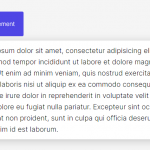| Author: | stemkoski |
|---|---|
| Views Total: | 10,819 views |
| Official Page: | Go to website |
| Last Update: | June 17, 2020 |
| License: | MIT |
Preview:

Description:
Just another virtual joystick controller that supports both mouse and touch events.
Written in plain JavaScript & HTML/CSS. No Canvas and SVG required.
How to use it:
1. Code the HTML for the joystick.
<div style="width: 128px"> <img src="images/joystick-base.png"/> <div id="stick" style="position: absolute; left:32px; top:32px;"> <img src="images/joystick-red.png"/> </div> </div>
2. Create an element to display the current status.
<div id="status"> Joystick </div>
3. The main JavaScript class for the joystick. Possible parameters:
- stickID: ID of HTML element (representing joystick) that will be dragged
- maxDistance: maximum amount joystick can move in any direction
- deadzone: joystick must move at least this amount from origin to register value change
class JoystickController
{
constructor( stickID, maxDistance, deadzone )
{
this.id = stickID;
let stick = document.getElementById(stickID);
// location from which drag begins, used to calculate offsets
this.dragStart = null;
// track touch identifier in case multiple joysticks present
this.touchId = null;
this.active = false;
this.value = { x: 0, y: 0 };
let self = this;
function handleDown(event)
{
self.active = true;
// all drag movements are instantaneous
stick.style.transition = '0s';
// touch event fired before mouse event; prevent redundant mouse event from firing
event.preventDefault();
if (event.changedTouches)
self.dragStart = { x: event.changedTouches[0].clientX, y: event.changedTouches[0].clientY };
else
self.dragStart = { x: event.clientX, y: event.clientY };
// if this is a touch event, keep track of which one
if (event.changedTouches)
self.touchId = event.changedTouches[0].identifier;
}
function handleMove(event)
{
if ( !self.active ) return;
// if this is a touch event, make sure it is the right one
// also handle multiple simultaneous touchmove events
let touchmoveId = null;
if (event.changedTouches)
{
for (let i = 0; i < event.changedTouches.length; i++)
{
if (self.touchId == event.changedTouches[i].identifier)
{
touchmoveId = i;
event.clientX = event.changedTouches[i].clientX;
event.clientY = event.changedTouches[i].clientY;
}
}
if (touchmoveId == null) return;
}
const xDiff = event.clientX - self.dragStart.x;
const yDiff = event.clientY - self.dragStart.y;
const angle = Math.atan2(yDiff, xDiff);
const distance = Math.min(maxDistance, Math.hypot(xDiff, yDiff));
const xPosition = distance * Math.cos(angle);
const yPosition = distance * Math.sin(angle);
// move stick image to new position
stick.style.transform = `translate3d(${xPosition}px, ${yPosition}px, 0px)`;
// deadzone adjustment
const distance2 = (distance < deadzone) ? 0 : maxDistance / (maxDistance - deadzone) * (distance - deadzone);
const xPosition2 = distance2 * Math.cos(angle);
const yPosition2 = distance2 * Math.sin(angle);
const xPercent = parseFloat((xPosition2 / maxDistance).toFixed(4));
const yPercent = parseFloat((yPosition2 / maxDistance).toFixed(4));
self.value = { x: xPercent, y: yPercent };
}
function handleUp(event)
{
if ( !self.active ) return;
// if this is a touch event, make sure it is the right one
if (event.changedTouches && self.touchId != event.changedTouches[0].identifier) return;
// transition the joystick position back to center
stick.style.transition = '.2s';
stick.style.transform = `translate3d(0px, 0px, 0px)`;
// reset everything
self.value = { x: 0, y: 0 };
self.touchId = null;
self.active = false;
}
stick.addEventListener('mousedown', handleDown);
stick.addEventListener('touchstart', handleDown);
document.addEventListener('mousemove', handleMove, {passive: false});
document.addEventListener('touchmove', handleMove, {passive: false});
document.addEventListener('mouseup', handleUp);
document.addEventListener('touchend', handleUp);
}
}4. Enable the joystick instance and update the status as follows:
let myStick = new JoystickController("stick", 64, 8);
function update()
{
document.getElementById("status").innerText = "Joystick1: " + JSON.stringify(joystick1.value);
}
function loop()
{
requestAnimationFrame(loop);
update();
}
loop();









